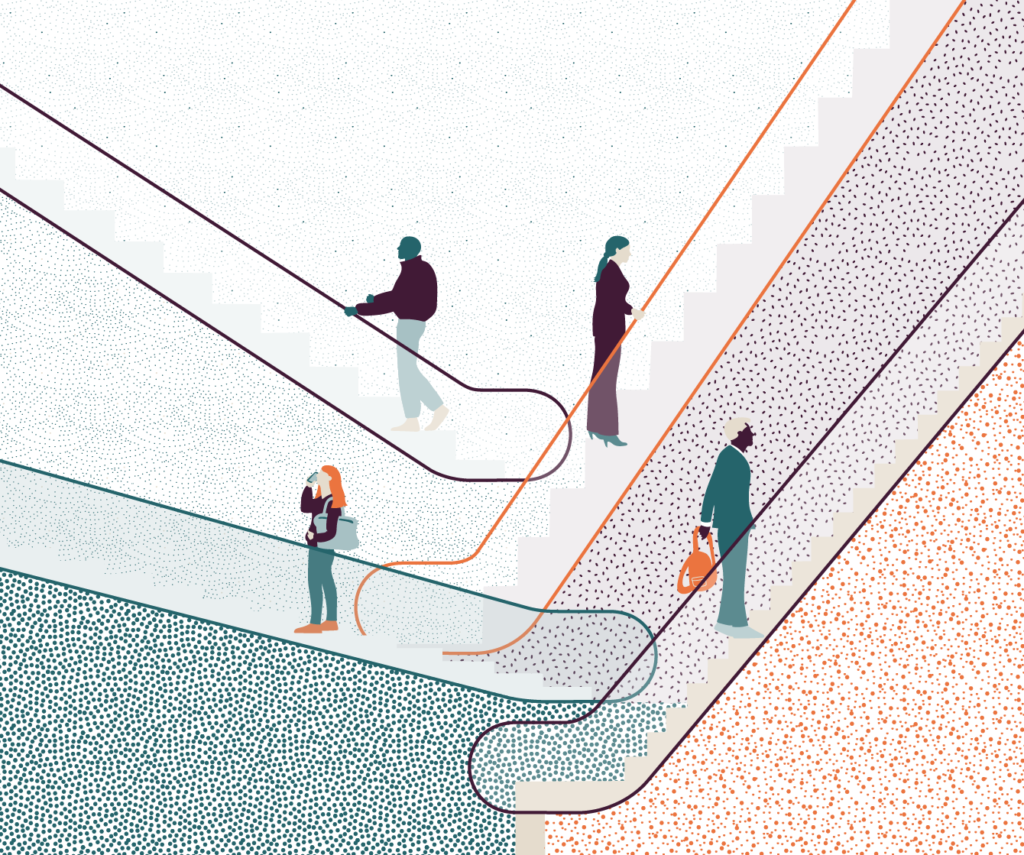More Wealth for All - But How? On the presentation of a Wealth Simulator for Germany
9/11/2023 – 10/11/2023
PLACE
Berlin
LANGUAGE
English & German

More wealth for all – but how?
On the presentation of a wealth simulator for Germany
What would actually change if a wealth tax of one percent were introduced in Germany? Would the share of the richest be significantly smaller in ten years? Would more change occur if every 20-year-old were given a state start-up capital of 30,000 euros? In the future, everyone will be able to calculate the outcome of this and other measures – via an interactive simulation calculator on the Forum’s own new website, which we will be presenting in Berlin on November 10. Among those taking part will be the world’s leading inequality researcher Branko Milanovic and the chief economist at the German Federal Ministry of Economics, Elga Bartsch.
XIII New Paradigm Workshop on 9. & 10. November 2023 in Berlin
The main event, the workshop on 10 November will be held in German language with simultaneous translation to English (except for the deep dive sessions in the afternoon, which will be conducted in English). The (invite-only) dinner panel on 9 November will be held in German language. Please see the agenda below for details.
We look forward to your participation!
Watch the workshop recording here.
Location 09.11. (Dinner): HABEL Restaurant, Luisenstraße 19, 10117 Berlin.
Location 10.11. (Workshop): Robert-Bosch-Stiftung (Atrium), Französische Straße 32, 10117 Berlin.
Directions can be found on this map.
18:30
ARRIVAL & REGISTRATION
HABEL Restaurant (Luisenstraße 19, 10117 Berlin)
19:00
DINNER: Beyond envy and performance – How much rich and poor can democracy take?
| ACHIM TRUGER (GERMAN COUNCIL OF ECONOMIC EXPERTS)
YANNICK HAAN (TAX ME NOW) FERDA ATAMAN (Federal Commissioner for Anti-Discrimination) VERA GOHLA (Author of the Report on Socio-Economic Disparities, FES) KATHARINA BECK (BÜNDNIS 90/ DIE GRÜNEN) TIMO LOCHOCKI (Resilient Democracy Project, OSF) |
(limited seats, only on confirmed registration)
09:00
ARRIVAL & REGISTRATION
Atrium at the Robert Bosch Foundation (Französische Str. 32, 10117 Berlin)
09:30
| WELCOME: ATJE DREXLER (ROBERT BOSCH FOUNDATION) |
ReBalance: A simulator – Why?
THOMAS FRICKE (FORUM NEW ECONOMY)
Perceived or real – How wealth is distributed in Germany
XHULIA LIKAJ (FORUM NEW ECONOMY)
| Rich economy – on the significance of corporate assets |
CARMEN GIOVANAZZI & VINCENT VICTOR (UNIVERSITÄT DUISBURG-ESSEN)
10:30
On the burden of inequality
KEYNOTE BY BRANKO MILANOVIC (CITY UNIVERSITY OF NEW YORK)
& TALK WITH DENNIS SNOWER (GLOBAL SOLUTIONS INITIATIVE)
| MODERATION: PETRA PINZLER (DIE ZEIT) |
11:30
COFFEE BREAK
12:00
| What if? – A model simulation for reducing wealth inequality in Germany
CHARLOTTE BARTELS (LMU MUNICH) Presentation of the wealth simulator Brief insight into a new website – FORUM NEW ECONOMY |
13:00
LUNCH BUFFET
14:00
Tax the rich – or what? How the gap between rich and poor could be effectively reduced
ELGA BARTSCH (FEDERAL MINISTRY FOR ECONOMIC AFFAIRS AND CLIMATE ACTION)
MARIO CZAJA (MEMBER OF THE GERMAN BUNDESTAG, CDU)
NORBERT WALTER-BORJANS (TAX JUSTICE NETWORK)
FABIO DE MASI (FINANZWENDE; UNIVERSITY OF CAPE TOWN)
CHARLOTTE BARTELS (LMU MUNICH)
CHAIR: ELLEN EHMKE (ROBERT BOSCH FOUNDATION)
15:15
COFFEE BREAK
15:30
DEEP DIVE SESSION *
How to model the impact of measures to reduce wealth inequality
TIMM BÖNKE (DIW BERLIN)
Lessons from the simulation – What are the policy implications?
MARTIN BEZNOSKA (IW KÖLN)
BRANKO MILANOVIC (CITY UNIVERSITY OF NEW YORK)
TIMM BÖNKE (DIW BERLIN)
MARTIN BIEWEN (UNIVERSITY OF TÜBINGEN)
CHRISTOPH TRAUTVETTER (NETZWERK STEUERGERECHTIGKEIT)
| CHAIR: MARTYNA LINARTAS (FU BERLIN & ungleichheit.info) |
17:30
END
* This part of the event will be held in English.
How far apart are income and wealth? What are the driving forces? And what is the best way to stop and reverse excessive trends? These questions have long been debated, even among academics. In a project lasting several years, the Forum New Economy, together with leading international and national experts on inequality, is trying to find reliable answers to these questions – on the basis of increasingly better data and broader knowledge, beyond the often politically emotional disputes. After a phase of three studies that focused on the state of the data and evidence, and a hierarchisation of the causes of inequality, the aim now is to gain a better understanding of the possible instruments for reducing wealth inequality.
To this end, we have commissioned a group of researchers led by Timm Bönke and Charlotte Bartels to develop, in an intensive steering process, a simulation model that will make it possible to estimate how individual wealth policy measures would actually change the distribution of wealth in Germany over a ten-year period.
The project was supported by the Robert Bosch Stiftung.
